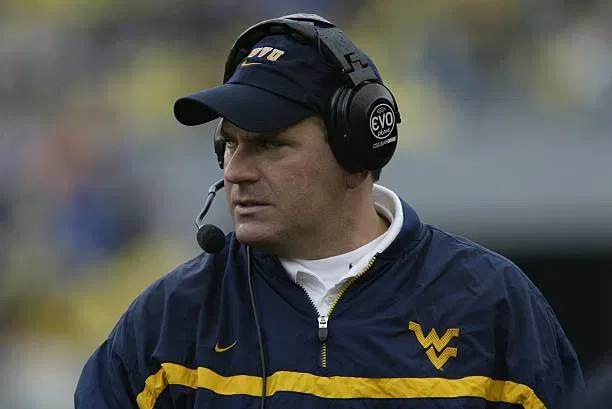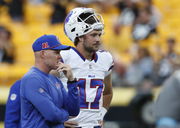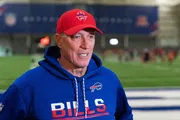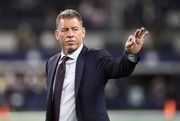

The House settlement may have handed universities a $20.5 million lifeline for NIL spending, but it also opened the door for a lot of problems, and West Virginia is feeling the heat. West Virginia hoped Rich Rodriguez’s return would revitalize their disappointing 6-7 season, but it hasn’t quite worked. Instead of a resurgence, the Mountaineers are struggling. Roster changes, scholarship issues, and player uncertainty complicate their rebuilding efforts, leaving them facing major challenges in the evolving landscape of college football.
Watch What’s Trending Now!
College athletics enters a new era as the NCAA eliminates sport-specific scholarship limits. Starting July 1, 2025, schools participating in the House v. NCAA settlement can offer scholarships to any number of athletes, subject to new roster limits. Football, for example, now has a 105-player cap, a sharp contrast to previous, larger rosters often including numerous walk-ons. This change directly implements the court settlement, promoting fairer treatment and financial opportunities for student-athletes.
But that’s where the problem begins. That’s when the designated athlete players become important. The new 105-player roster limit in football has resulted in some players losing their guaranteed positions. These athletes usually play minor roles, often as non-scholarship walk-ons or players far down on the depth chart. Highlighting a mass exclude risk Mountaineer Paul gave a speculation on Locked on West Virginia podcast, “There’s a bunch of different ways this could go, but typically these are going to be your more fringe players, non‑scholarship athletes or walk‑ons. But it could also be, maybe you’ve got a guy that’s second string that doesn’t want to play.” There comes the twist.
ADVERTISEMENT
Rich Rodriguez’s West Virginia student-athletes don’t need to leave the team, despite the new 105-player roster limit. Thanks to the NCAA settlement’s grandfather clause, players already on the 2024-25 roster with remaining eligibility can stay for 2025-26. They won’t count against the cap, letting West Virginia exceed 105 players. “Like if it was Nate Flower or Raymond Kovaleeski, just naming two guys—they’re the designated student-athlete. They can stay on West Virginia’s roster for the ’25-’26 season and West Virginia can still field the 105 players… effectively having a 117‑player roster,” Paul added.
However the problem still exists as it’s tough to spot Rich Rodriguez’s teams classified as “designated student-athletes” under the new NCAA rules. Despite that Paul successfully spotted some of them. “I went through, I got 12 players; I don’t know if I got the right 12. Hell, I might even have half of them. Because I mean, I think this is open to interpretation. You could probably make anybody a non‑scholarship player at some point. It’s possible to take somebody off the books, put them on the books,” Paul added. Now, with a threat of mass exclude lying on the head Rich Rodriguez is all set to take the next step for West Virginia’s success.
ADVERTISEMENT
Rich Rodriguez’ massive QB1 move comes to light
Rich Rodriguez’s return to West Virginia headlines the 2025 college football season. His 2007 departure, following a devastating loss to Pittsburgh that dashed national title hopes, remains controversial. Now, he returns with unfinished business and much to prove. And ESPN analyst Paul Finebaum is right out there backing Rich Rodriguez’s turnaround season.
“I think Rich Rodriguez is one of the great stories in college football. He has proven himself. He’s come back against all odds, and I mean absolutely all,” Finebaum said, praising his comeback. Known for his quarterback management, Rodriguez hasn’t named a starter yet, but now that they are going to face Robert Morris and Ohio State in the first two weeks, he might send Nicco Marchiol and Jaylen Henderson into action.
ADVERTISEMENT
West Virginia insider Mountaineer Paul discussed Rich Rodriguez’s unconventional coaching style. Paul noted Rich Rodriguez’s disregard for norms: “Rich Rodriguez doesn’t care about norms. As a matter of fact, if you listen to him tell it, he’d play three or four [quarterbacks] if they were good enough.” Then he even talks about his flexible, aggressive offensive approach, a philosophy dating back to his Big East days with Pat White and continuing through coaching stops at Michigan, Arizona, Jackson State, Tulane, and Clemson.
Top Stories
Prayer Pours In From Gisele Bündchen as Tom Brady’s Ex-Wife Mourns Tragic Personal Loss

Bills Announce Concerning Josh Allen News as Owner Unloads on NFL Refs For Brandin Cooks Incident

Jim Kelly Doesn’t Hold Back In Public Message to Sean McDermott as Bills Identify Next HC

ESPN’s Troy Aikman Bids Goodbye as NFL Broadcasting Season Ends for the Network

Ousted Hailie Deegan Makes Shocking NASCAR Return After Failed IndyCar Experiment

Who Are Kyle Tucker’s Parents? All about Mike Tucker and Lisa Fernandez

Paul emphasized Rodriguez’s belief that multiple quarterbacks are a strength, not a weakness, perfectly suited to his spread option, no-huddle offense. “He said he doesn’t buy into the saying if you have two quarterbacks, you have none. He sees having multiple quarterbacks as a strength, not a weakness… Obviously, we know his spread option, no-huddle offense thrives on that flexibility, and he’s proven it in the past by rotating quarterbacks at every stop.” With potential starter Garrett Marchiol and the versatile Nicco Henderson, Rodriguez might have the pieces to revitalize West Virginia football, a prospect Athletic Director Wren Baker reportedly supports.
ADVERTISEMENT
ADVERTISEMENT
ADVERTISEMENT
ADVERTISEMENT



